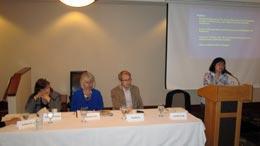Effects of unaffordable housing already evident, experts say

By Florence Hwang,
Special to The Post
When asked about the ramifications of unaffordable housing on Vancouverites, Dr. David Ley cites the recent Angus Reid poll.
“Many people are stressed, have long commutes, heavy mortgage debts and move away from the region,” he says.
Ley, who works at the Department of Geography at the University of British Columbia, was one of the four panelists discussing unaffordable housing in Vancouver at an event hosted by the Friends of Hong Kong (FOHK) June 19. Ley, Sandy Garossino, Editor-in-Chief, Vancouver Observer, Eveline Xia, Community Advocate, and Councillor Adriane Carr, Vancouver City Council made up the panel.
He thinks that Canada, like other nations, must have serious funding from the federal government for affordable housing.
Ley cites several factors that contribute to unaffordable housing in Vancouver, such as low local incomes and foreign investments.
“So funds must come from outside the region. Some will be from investors living elsewhere in Canada, but much of the financing comes from the funds originating off-shore,” says Ley.
Also, Vancouver’s geography with mountains and ocean also limit the amount of developable land, he noted.
“Provincial and local government could make their residential sales taxes more progressive by reducing or eliminating them for first-time buyers who are Canadian citizens and increasing them for high-priced properties,” he says.
Although people are suggesting that the soaring real estate price is due to the influx of immigration, Ley argued strongly that whereas the immigration numbers remained more or less the same before and after 2000, the real estate price soared sharply after 2000. No longer is there the normal/standard ratio of 1:1 (meaning 1 immigrant family to 1 home). It is because of the change in immigration pattern, meaning much more wealthy immigrants were coming in while the price doubled.
“Provincially and municipally, very few people are willing to come out and say it (foreign investment). That’s how much denial there is,” says Xia.
Vancouver’s unaffordability housing rates have been compared to Hong Kong.
FOHK is a network of ex-Hongkongers, Hongkongers and friends of Hongkongers. Their purpose is to provide a platform conducive to intelligent and informed discussion of important issues concerning both Canada and Hong Kong.
During the panel discussion, some of of the points raised included:
• There is a disconnect between real estate and the local economy.
• The property prices are so high in the City of Vancouver that even the emergency response team members (such as firefighters and police officers) can't afford to live in the city, which greatly impacts their response time and service delivery.
• The City of Vancouver is the largest landowner. It controls the land and controls the supply of land. Zoning and development feeds on land speculation, rezoning and price speculation (chained reaction)
• Xia points to Australia, which strongly implements its rules.
“People face jail time if they break the rules. We’re at step zero. Other people are at step 10,” she says.
In Alberta, subject to certain exceptions for commercial ventures (including limited natural resource extraction or processing and residential development), non-residents and foreign-controlled corporations can own up to 20 acres of agricultural land.
In Saskatchewan, non-residents and foreign entities can own up to 10 acres of Saskatchewan farm land.
In Manitoba, non-residents and foreign entities can own up to 40 acres of farm land.
In Quebec, non-residents and foreign-controlled entities must get permission to buy more than 4 hectares (or about 10 acres) of agricultural land from the Commission de la protection du territoire agricole du Québec.
In Ontario and BC, there are no restrictions on foreign ownership.









